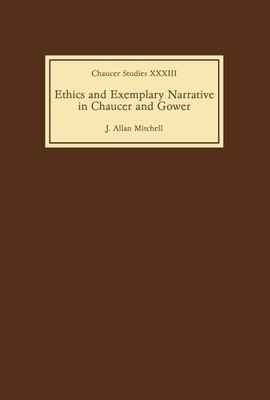
- We will send in 10–14 business days.
- Author: J Allan Mitchell
- Publisher: Boydell & Brewer
- ISBN-10: 1843840197
- ISBN-13: 9781843840190
- Format: 16.4 x 24.2 x 1.9 cm, hardcover
- Language: English
- SAVE -10% with code: EXTRA
Ethics and Exemplary Narrative in Chaucer and Gower (e-book) (used book) | bookbook.eu
Reviews
Description
A lively defence of the ethics of exemplary narrative, and a detailed account of its forms and functioning in the works of Geoffrey Chaucer and John Gower.
Why do medieval writers routinely make use of exemplary rhetoric? How does it work, and what are its ethical and poetical values? And if Chaucer and Gower must be seen as vigorously subverting it, then why do they persist in using it? Borrowing from recent developments in ethical criticism and theory, this book addresses such questions by reconstructing a late medieval rationale for the ethics of exemplary narrative. The author argues that Chaucer's Canterbury Tales and Gower's Confessio Amantis attest to the vitality of a narrative - rather than strictly normative - ethics that has roots in premodern traditions of practical reason and rhetoric. Chaucer and Gower are shown to be inheritors and respecters of an early and unexpected form of ethical pragmatism - which has profound implications for the orthodox history of ethics in the West.Recipient of the 2008 John H. Fisher Award forsignificant contribution to the field of Gower Studies. Dr J. ALLAN MITCHELL teaches in the Department of English, University of Victoria.
EXTRA 10 % discount with code: EXTRA
The promotion ends in 18d.20:12:49
The discount code is valid when purchasing from 10 €. Discounts do not stack.
- Author: J Allan Mitchell
- Publisher: Boydell & Brewer
- ISBN-10: 1843840197
- ISBN-13: 9781843840190
- Format: 16.4 x 24.2 x 1.9 cm, hardcover
- Language: English English
A lively defence of the ethics of exemplary narrative, and a detailed account of its forms and functioning in the works of Geoffrey Chaucer and John Gower.
Why do medieval writers routinely make use of exemplary rhetoric? How does it work, and what are its ethical and poetical values? And if Chaucer and Gower must be seen as vigorously subverting it, then why do they persist in using it? Borrowing from recent developments in ethical criticism and theory, this book addresses such questions by reconstructing a late medieval rationale for the ethics of exemplary narrative. The author argues that Chaucer's Canterbury Tales and Gower's Confessio Amantis attest to the vitality of a narrative - rather than strictly normative - ethics that has roots in premodern traditions of practical reason and rhetoric. Chaucer and Gower are shown to be inheritors and respecters of an early and unexpected form of ethical pragmatism - which has profound implications for the orthodox history of ethics in the West.Recipient of the 2008 John H. Fisher Award forsignificant contribution to the field of Gower Studies. Dr J. ALLAN MITCHELL teaches in the Department of English, University of Victoria.


Reviews